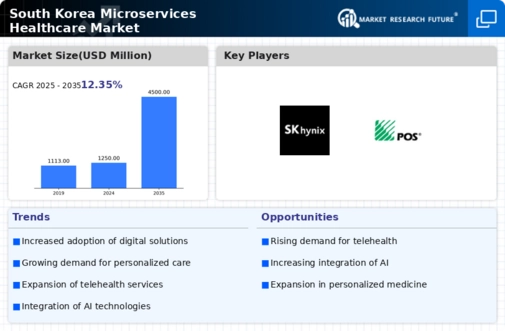Integration of Advanced Technologies
The integration of advanced technologies such as artificial intelligence (AI), machine learning (ML), and the Internet of Things (IoT) is a key driver of the microservices healthcare market in South Korea. These technologies enable healthcare providers to enhance service delivery, improve patient monitoring, and streamline operations. For instance, AI algorithms can analyze vast amounts of patient data to identify trends and predict health outcomes, while IoT devices facilitate real-time health monitoring. The microservices architecture allows for seamless integration of these technologies, promoting interoperability and data sharing among healthcare systems. As a result, the market is expected to witness a growth rate of around 12% annually, reflecting the increasing reliance on technology-driven healthcare solutions. This trend indicates a shift towards more efficient and responsive healthcare services, ultimately benefiting patients and providers alike.
Rising Focus on Patient-Centric Care
The microservices healthcare market is increasingly influenced by a rising focus on patient-centric care in South Korea. Healthcare providers are recognizing the importance of placing patients at the center of care delivery, which necessitates the adoption of flexible and scalable microservices architectures. This approach allows for the customization of services based on individual patient needs, preferences, and feedback. As a result, healthcare organizations are investing in technologies that enhance patient engagement and satisfaction. Surveys indicate that approximately 70% of patients prefer healthcare services that prioritize their personal health goals. This shift towards patient-centric care is likely to drive the growth of the microservices healthcare market, as providers seek to improve patient experiences and outcomes through innovative service delivery models.
Increased Investment in Health IT Infrastructure
Investment in health IT infrastructure is a critical driver of the microservices healthcare market in South Korea. As healthcare organizations strive to modernize their systems, there is a growing emphasis on adopting microservices architectures to enhance flexibility and scalability. Recent reports suggest that health IT spending in South Korea is projected to reach $3 billion by 2026, reflecting a strong commitment to upgrading technological capabilities. This investment is aimed at improving data management, interoperability, and overall operational efficiency within healthcare systems. By leveraging microservices, organizations can more easily integrate new technologies and respond to evolving healthcare demands. Consequently, the microservices healthcare market is likely to benefit from this influx of capital, facilitating the development of innovative solutions that address current and future healthcare challenges.
Regulatory Support for Digital Health Innovations
In South Korea, the government is actively promoting digital health innovations, which significantly impacts the microservices healthcare market. Recent regulatory frameworks have been established to encourage the adoption of digital health technologies, including microservices. These regulations aim to streamline the approval process for new healthcare applications and services, thereby fostering a conducive environment for innovation. The government has allocated substantial funding, estimated at $200 million, to support research and development in digital health. This financial backing is expected to accelerate the integration of microservices in healthcare systems, enhancing operational efficiency and patient outcomes. As regulatory support continues to strengthen, the microservices healthcare market is poised for substantial growth, attracting investments and driving technological advancements.
Growing Demand for Personalized Healthcare Solutions
The microservices healthcare market in South Korea is experiencing a notable shift towards personalized healthcare solutions. This trend is driven by an increasing consumer preference for tailored medical services that cater to individual health needs. As patients seek more control over their healthcare journeys, providers are adopting microservices architectures to deliver customized treatment plans and enhance patient engagement. The market is projected to grow at a CAGR of approximately 15% over the next five years, indicating a robust demand for innovative healthcare solutions. This growth is further supported by advancements in data analytics and artificial intelligence, which enable healthcare providers to offer more precise and effective treatments. Consequently, the microservices healthcare market is likely to expand as organizations invest in technologies that facilitate personalized care.













Leave a Comment